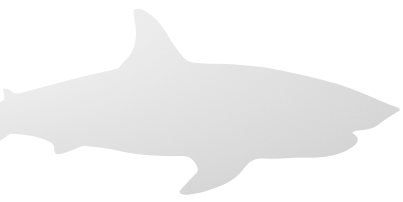General News
Over 50 NGOs urge EU to put ocean health at the heart of next long-term budget
27 February 2026
The Blue Manifesto has been supported by +140 organisations
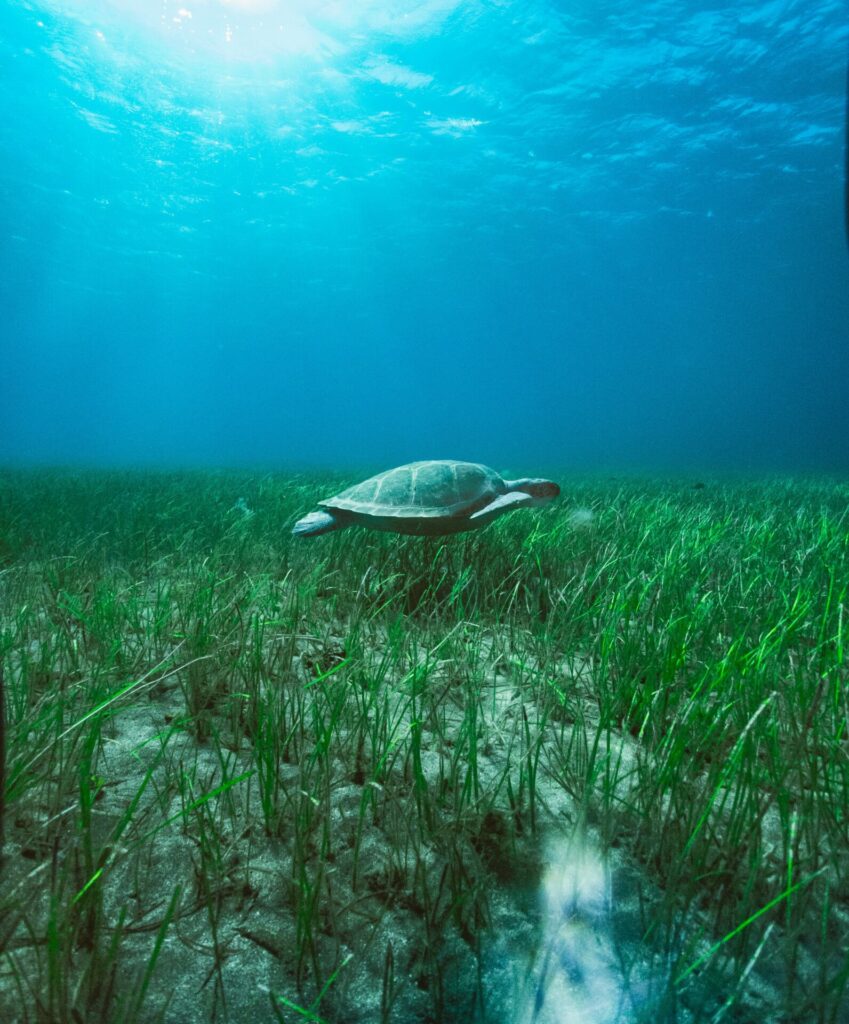
Imagine a world where the ocean teems with life, marine ecosystems flourish, and where coastal communities thrive in harmony with nature. This vision is not just a dream; it’s an achievable reality, and the Blue Manifesto is our urgent call to action to make it happen. Civil society organisations across Europe have united to provide EU decision- and policy-makers with a clear roadmap to a healthy and resilient ocean by 2030, and to a more sustainable and equitable future for generations to come.
The ocean, where life began some 4 billion years ago, is vital to the survival of all life on Earth. It provides half the oxygen on Earth, stabilises our climate, and supports all of the life on our planet. It contributes to food security, delivers renewable energy, connects countries and continents, supports a wide array of blue businesses, and is a source of well-being and happiness.
The EU boasts the world’s largest maritime territory with almost half its population living within 50 kilometres of a coastline. In past decades, the EU has adopted a succession of strategies and action plans to protect its seas and ensure the well-being of coastal communities. Yet, while well intended, a lack of policy coherence, poor implementation and fragmented governance have hampered progress. The European Green Deal’s goal to secure a climate-neutral EU by 2050 is commendable, as well as its commitment to leave no one behind, do no harm, and reduce pollution to zero. However, these ambitious yet achievable objectives are only partially addressed in the EU’s existing blue policies.

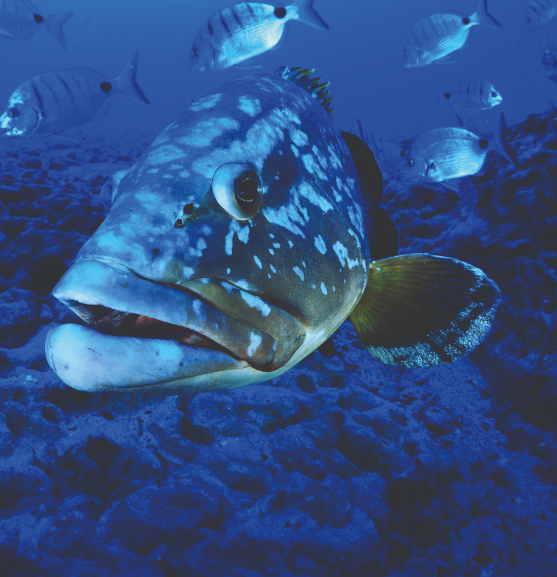
The relentless pursuit of
Blue Growth
Is pushing European Seas to the brink
Against this backdrop, the relentless pursuit of “blue growth” is pushing European seas to the brink. Member States missed 2020 targets to achieve a good environmental status for Europe’s seas, especially in terms of contaminants, eutrophication, invasive alien species, commercial fishing, and marine litter, paving the way for ocean health to deteriorate further. Over 90% of Europe’s marine area is over-exploited as a result of intensive fishing, shipping, oil and gas drilling, tourism and other coastal activities, while emerging activities like the large-scale rollout of offshore wind energy add to these multiple pressures.¹ Destructive practices such as bottom trawling continue in 90% of EU offshore marine “protected” areas, and more than 14 million tonnes of plastic still enter the ocean each year.
Climate change is also hitting the ocean hard and fast. Sudden and steep rises in ocean temperature observed in recent years are accelerating de-oxygenation and acidification, which in turn devastate marine biodiversity.
We need to reverse the decline of ocean health to protect marine life, public health, and livelihoods for generations to come.²
² European Climate Risk Assessment — European Environment Agency (europa.eu
The current policy landscape cannot bring about change at the scale and pace needed.
Some EU policies are no longer fit for purpose, others need an urgent injection of funds and political will, and emerging challenges demand new measures. To protect and restore the ocean and its marine life, policy coherence must be strengthened and the transition to a socially just and low-impact blue economy accelerated.
We propose a three-point rescue plan and a step-by-step roadmap of EU policy action:
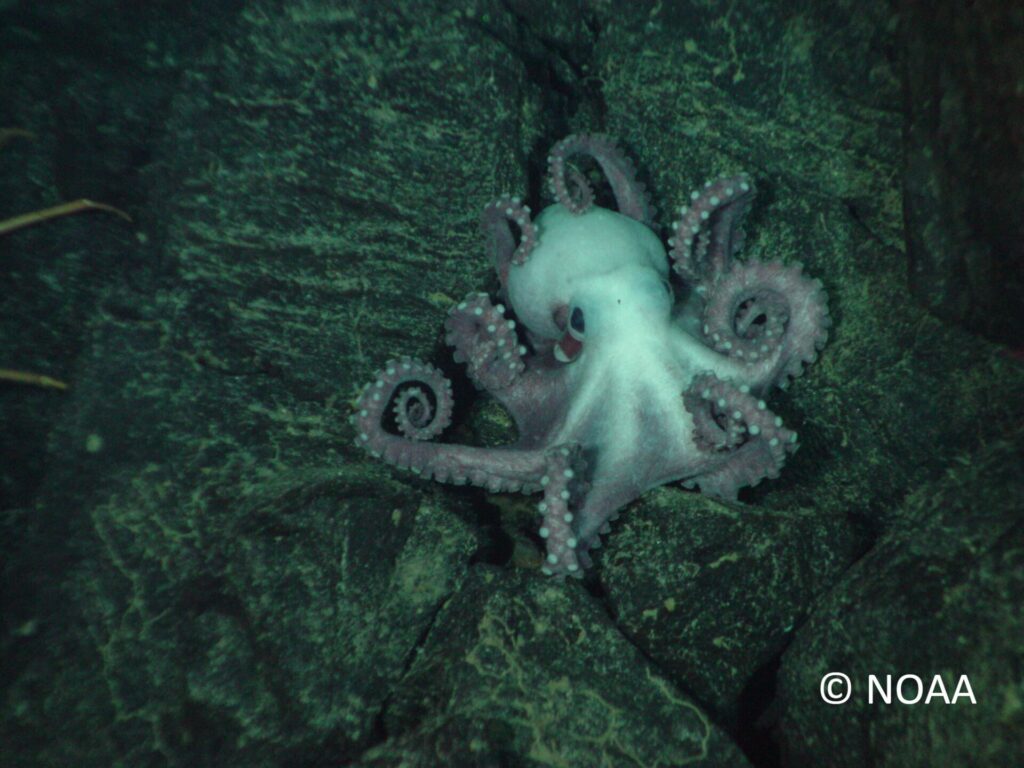
Adopt an overarching and ambitious EU Ocean Deal to make sure all policies and legislation that impact the ocean are working in harmony with one another. The Ocean Deal would create a framework to integrate existing and new legislation, guaranteeing that all ocean-related policies are fit for preserving and restoring the ocean and coastal communities. The Ocean Deal should improve compliance with and enforcement of environmental rules at national and international levels, promote transparency in ocean-related activities, and integrate strong reporting and access to justice provisions.
Turn ambition to action with an EU Ocean Fund dedicated to the long-term restoration and conservation of the marine environment, and to the just transition to a sustainable, low-impact blue economy for the benefit of all. Subsidies that are harmful to the marine environment should be eliminated as soon as possible and no later than 2027, both at the EU and Member State levels. Taxpayers’ money should be invested in delivering the objectives of the Ocean Deal; the revision of the EU Multiannual Financial Framework (MFF) in 2027 will be an opportunity to do so, as well as a chance to increase the level of funding dedicated to the ocean overall.
Put the ocean at the heart of EU decision-making, ensuring coherence between different policies and initiatives that impact the ocean. European Parliament Committees responsible for policies impacting the Ocean Deal and Fund (e.g. Environment, Fisheries, Transport and Tourism, Industry and Energy, and Budget Committees) should hold regular joint sessions to ensure coherence among sectoral policies related to the ocean, including climate and marine protection. A crosscutting Ocean Commissioner should be appointed in the new European Commission, and joint Council meetings of Environment, Energy, Fisheries and Transport ministers should be held within each Council Presidency to make progress on the implementation of the Ocean Deal.


The Ocean Deal must serve as the overarching framework for the many policy initiatives that need to be rolled out in coming years, outlined in this Blue Manifesto.
Under this umbrella, current ocean-related policies will need to be revised and new policies adopted to ensure robust protection and effective restoration of marine biodiversity by 2030.
We propose the following timeline for achieving these objectives:
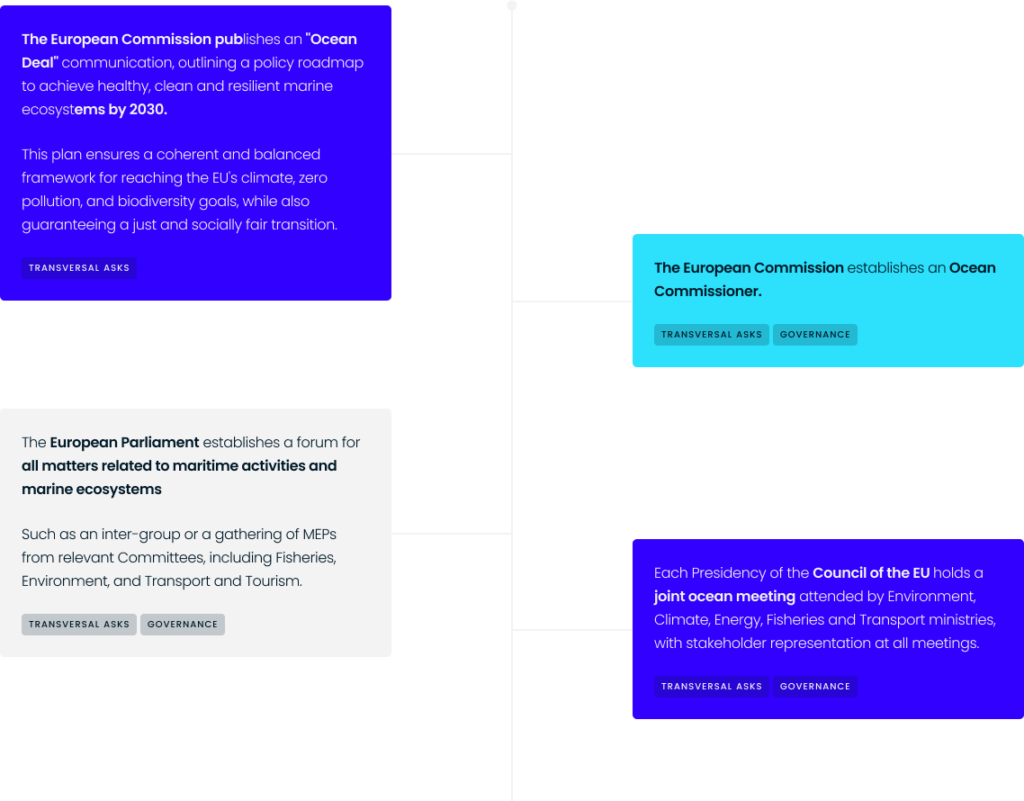
The Ocean Deal must serve as the overarching framework for the many policy initiatives that need to be rolled out in coming years, outlined in this Blue Manifesto.
View RoadmapThis vision for 2030 is not just wishful thinking. Our step-by-step roadmap is a pragmatic, well-researched and science-based plan to guide the EU in restoring marine life by ending overexploitation, destructive practices, and pollution.
2030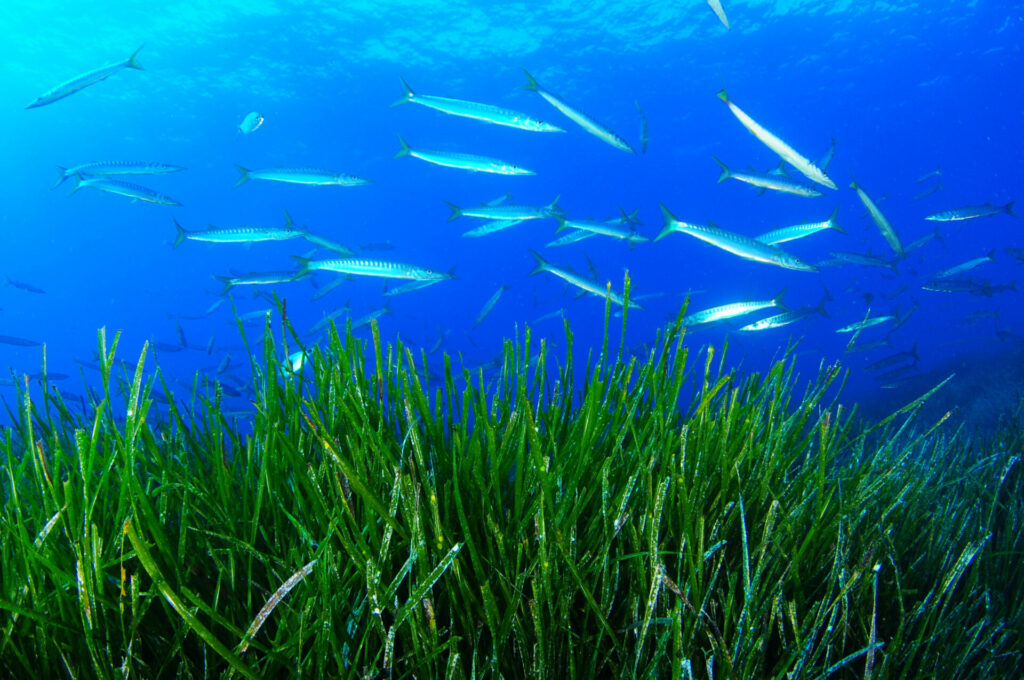
And we’re not starting from zero; a wealth of ready-to-deploy solutions already exist. Across Europe, innovative initiatives by startups and local communities are making a difference, from wind-powered commercial vessels to nature-inclusive design for wind farms. Restoration initiatives are contributing to climate mitigation and flood protection. Regenerative cooperative farms for seaweed, mussels, and oysters are using farming methods that avoid fertilisers, pesticides and freshwater and help coastal communities thrive. Low-impact fishers are working with local NGOs, scientists, and administrations to co-manage fish resources, resulting in abundant fish populations, fairer prices and very short local supply chains. With EU support, examples like these can be rapidly upscaled.
Nature undeniably has intrinsic value in and of itself, and we are lucky that with the right policies in place, we can also benefit from a healthy ocean. By investing in a blue economy that is nature-positive and promotes social standards, the EU can restore marine life and biodiversity while creating quality employment that enables gender equality, social inclusion, and access to adequate wages.
2030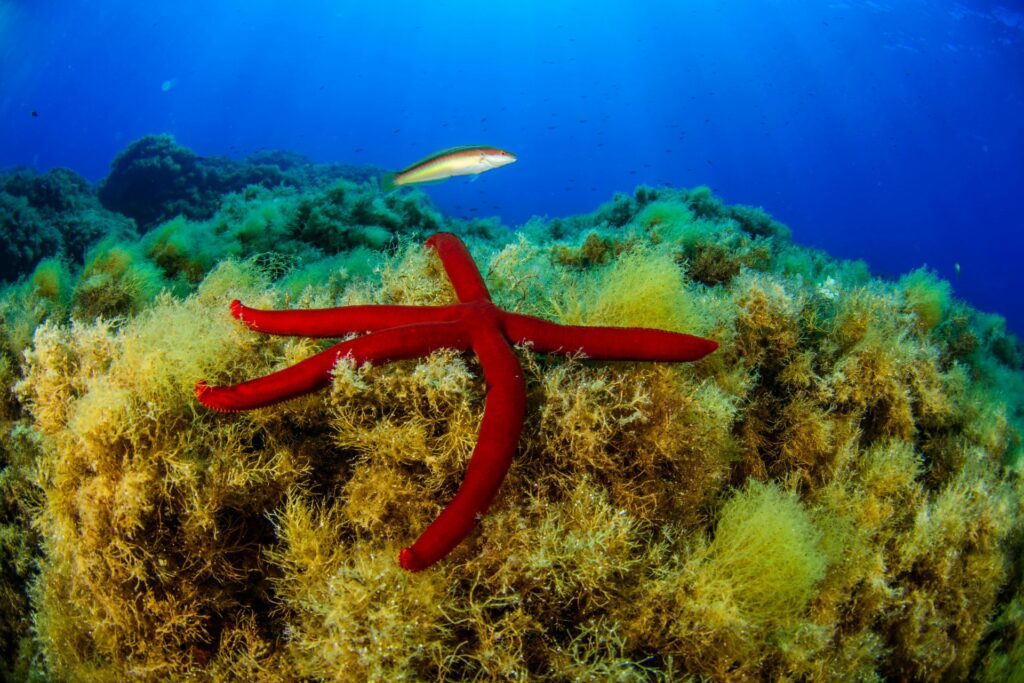
Europe has a unique opportunity to become an inspiring global leader by taking bold action to safeguard marine ecosystems. The stakes are high, and with 2030 fast approaching, the coming years will be decisive if the EU institutions are to leave a positive legacy for generations to come.
The European Ocean Pact, as announced by European Commission President Ursula von der Leyen in her Political Guidelines for the next European Commission 2024-2029, represents a promising first step in the right direction. It will be crucial to ensure that such a Pact aligns with the Ocean Deal vision and policy roadmap proposed in this Blue Manifesto.
Public support is undeniably strong: a recent Eurobarometer poll shows that an overwhelming majority of EU citizens see climate change as a serious threat, and agree that tackling climate change should be a priority to improve public health.
It is therefore up to these leaders to take the urgent actions needed to nurse the ocean back to health and ensure the prosperity and longevity of the communities they represent. With unwavering political commitment and robust implementation, we can achieve the change that the ocean, and all of us, need.




